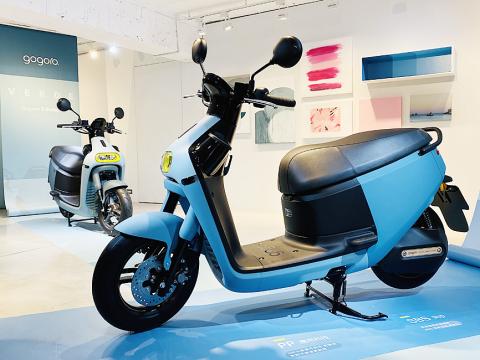The government’s new and larger-scale subsidies for scooter replacements would drive electric scooter demand, Gogoro Inc (睿能創意) said yesterday, boosting electric scooter’s market share to about 20 percent this year, from 15 percent last year.
The spread of COVID-19 has also helped propel electric scooter sales as people avoid public transportation to prevent contracting the virus, the company said.
“The epidemic gave an unexpected boost [to sales],” Gogoro chief marketing executive Chen Yen-yang (陳彥揚) told the Taipei Times at the launch of the Gogoro 3 Delight, a new addition to the Gogoro 3 series.

Photo: Yang Ya-min, Taipei Times
“People are more willing to spend on new scooters now,” Chen said. “In February, we saw sales of Gogoro 2 and Gogoro 3 series jump 300 percent from January, as those models are suitable for long commutes.”
Growth is expected to continue the rest of the year, he said.
In the first week of this month, electric scooters accounted for 15.33 percent of overall new scooter sales in Taiwan, up from 11 percent at the end of last month, he said.
For this year, Gogoro forecasts that about 200,000 new electric scooters would be sold, versus the whole scooter market, totaling 950,000 units.
Central and local governments are providing subsidies for riders who replace their old four-stroke scooters with electric scooters or new gas-fueled scooters, starting this year. More than 5 million scooter owners are eligible for the subsidies.
The subsidies have a wider coverage than a previous program, which was available to only between 700,000 and 800,000 two-stroke scooter owners in the past few years.
Based on new subsidy schemes, owners are eligible to receive as much as a NT$28,000 (US$929) subsidy for replacing an old four-stroke scooter.
To cope with increased electric scooter demand, Gogoro aims to add 1,000 traditional scooter stores to its sales network to promote its scooters and provide maintenance services, Chen said.
Last year, only 100 traditional scooter stores teamed up with Gogoro.
As Gogoro has found success domestically, it plans to expand to Israel this year by selling its ultralight model, Gogoro VIVA, it said, but declined to provide more details about its overseas expansion.

Anna Bhobho, a 31-year-old housewife from rural Zimbabwe, was once a silent observer in her home, excluded from financial and family decisionmaking in the deeply patriarchal society. Today, she is a driver of change in her village, thanks to an electric tricycle she owns. In many parts of rural sub-Saharan Africa, women have long been excluded from mainstream economic activities such as operating public transportation. However, three-wheelers powered by green energy are reversing that trend, offering financial opportunities and a newfound sense of importance. “My husband now looks up to me to take care of a large chunk of expenses,

SECTOR LEADER: TSMC can increase capacity by as much as 20 percent or more in the advanced node part of the foundry market by 2030, an analyst said Taiwan Semiconductor Manufacturing Co (TSMC, 台積電) is expected to lead its peers in the advanced 2-nanometer process technology, despite competition from Samsung Electronics Co and Intel Corp, TrendForce Corp analyst Joanne Chiao (喬安) said. TSMC’s sophisticated products and its large production scale are expected to allow the company to continue dominating the global 2-nanometer process market this year, Chiao said. The world’s largest contract chipmaker is scheduled to begin mass production of chips made on the 2-nanometer process in its Hsinchu fab in the second half of this year. It would also hold a ceremony on Monday next week to

TECH CLUSTER: The US company’s new office is in the Shalun Smart Green Energy Science City, a new AI industry base and cybersecurity hub in southern Taiwan US chip designer Advanced Micro Devices Inc (AMD) yesterday launched an office in Tainan’s Gueiren District (歸仁), marking a significant milestone in the development of southern Taiwan’s artificial intelligence (AI) industry, the Tainan City Government said in a statement. AMD Taiwan general manager Vincent Chern (陳民皓) presided over the opening ceremony for the company’s new office at the Shalun Smart Green Energy Science City (沙崙智慧綠能科學城), a new AI industry base and cybersecurity hub in southern Taiwan. Facilities in the new office include an information processing center, and a research and development (R&D) center, the Tainan Economic Development Bureau said. The Ministry

ADVERSARIES: The new list includes 11 entities in China and one in Taiwan, which is a local branch of Chinese cloud computing firm Inspur Group The US added dozens of entities to a trade blacklist on Tuesday, the US Department of Commerce said, in part to disrupt Beijing’s artificial intelligence (AI) and advanced computing capabilities. The action affects 80 entities from countries including China, the United Arab Emirates and Iran, with the commerce department citing their “activities contrary to US national security and foreign policy.” Those added to the “entity list” are restricted from obtaining US items and technologies without government authorization. “We will not allow adversaries to exploit American technology to bolster their own militaries and threaten American lives,” US Secretary of Commerce Howard Lutnick said. The entities